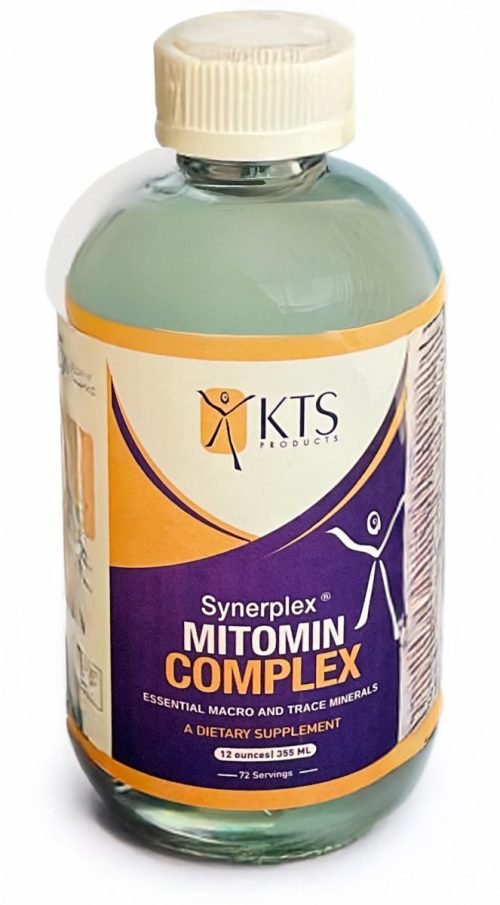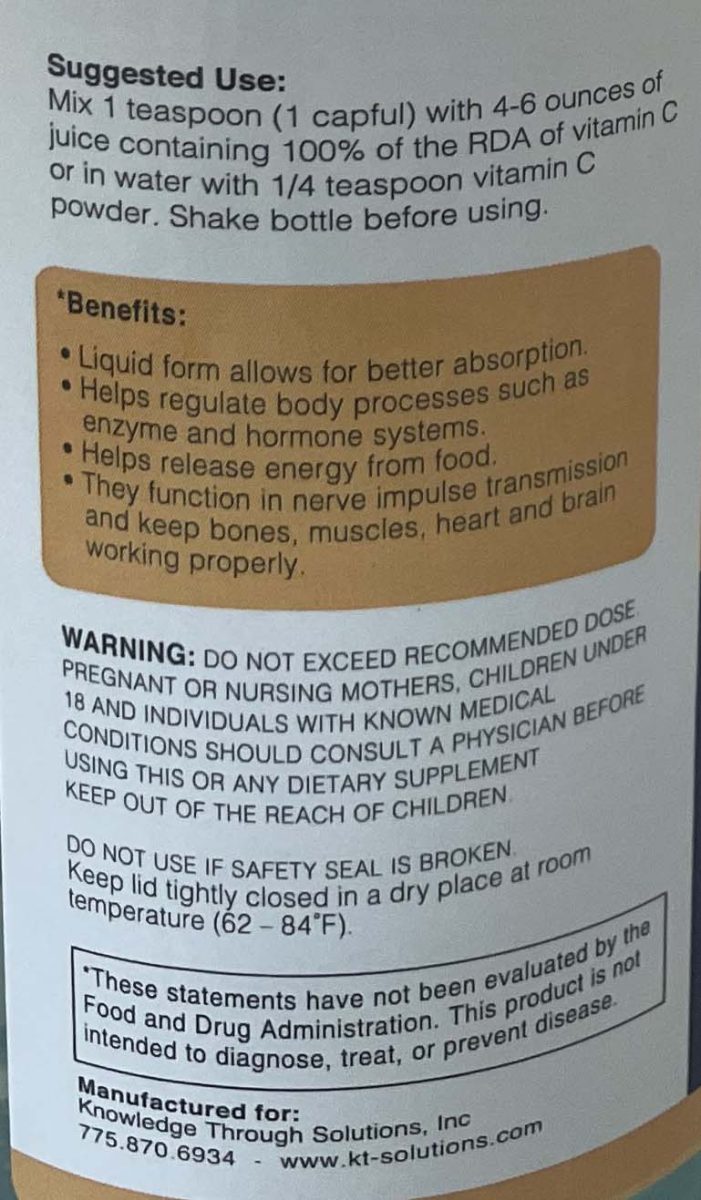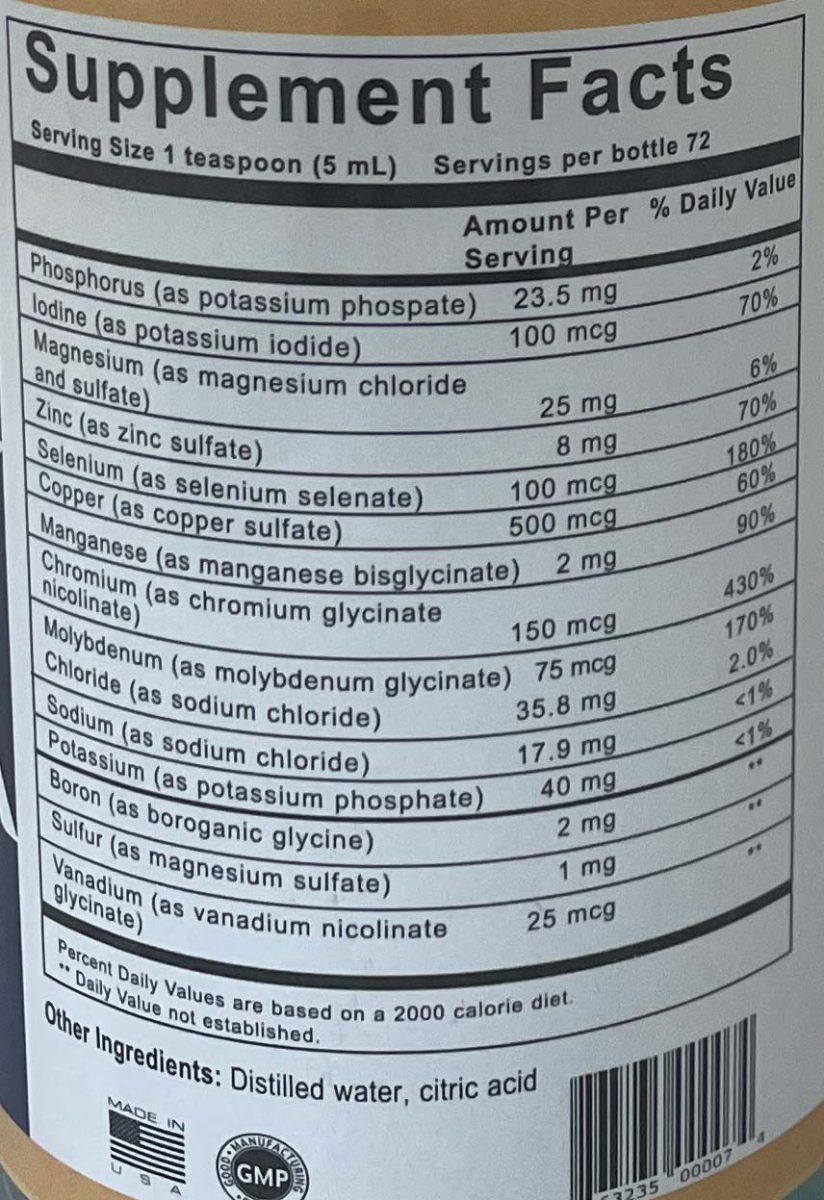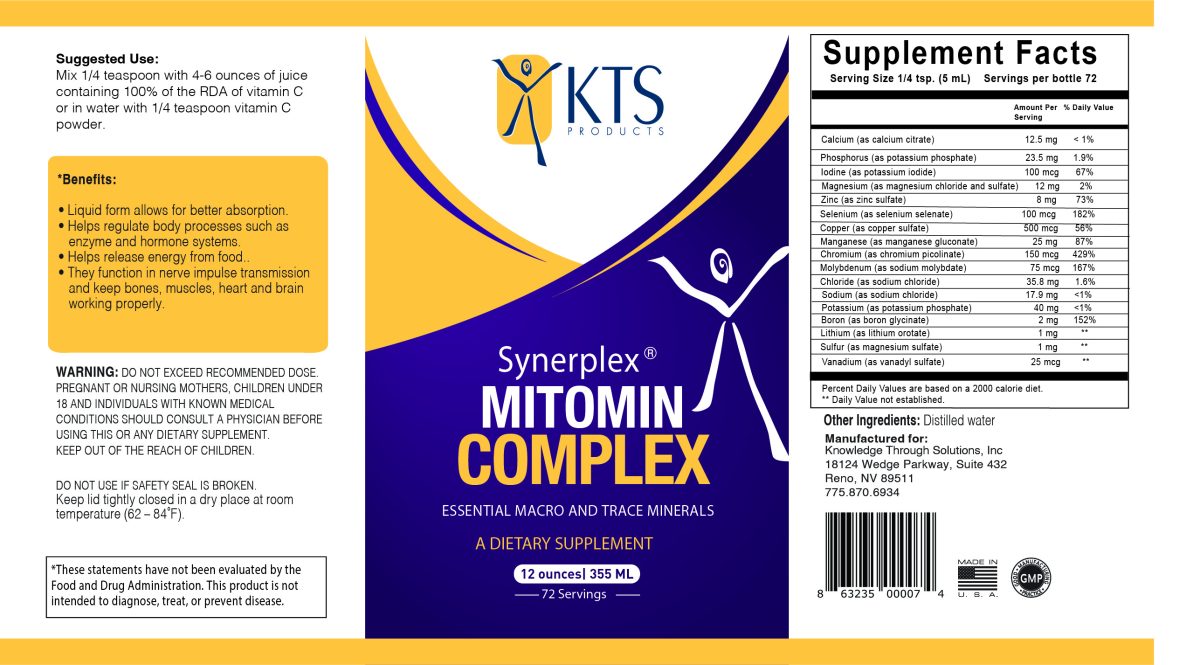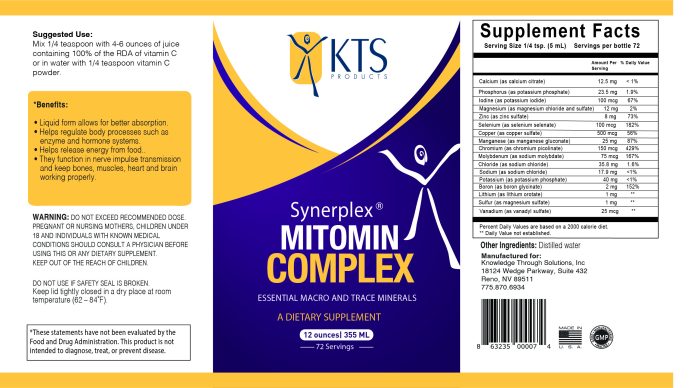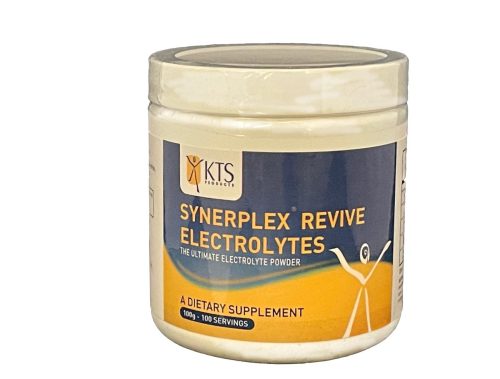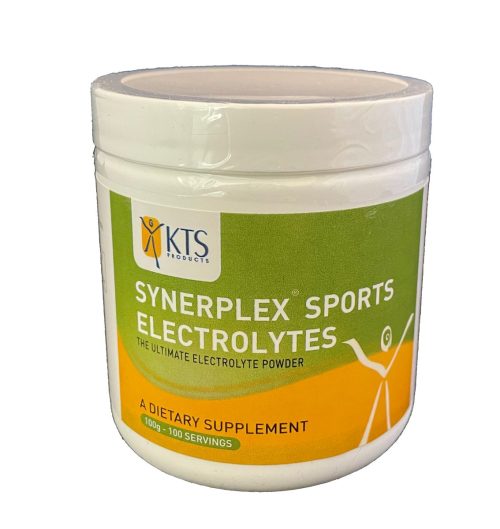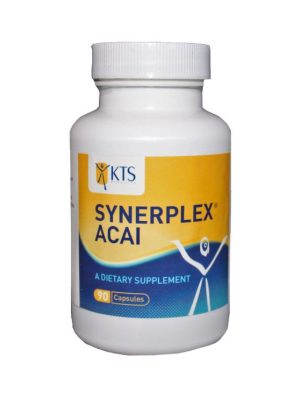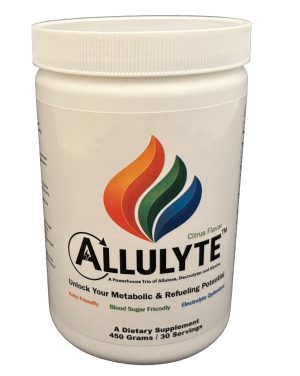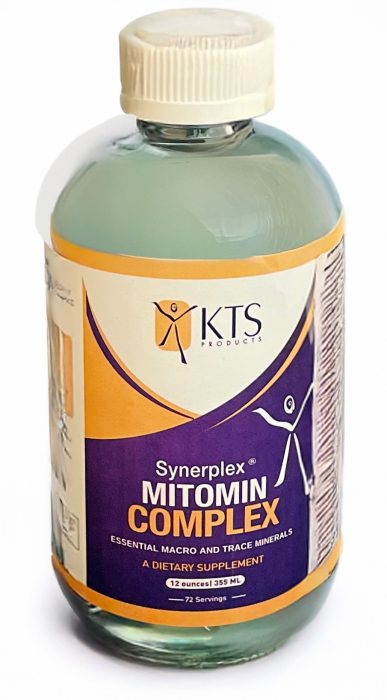
Unlock the power of optimal health with Synerplex MitoMin Complex, a cutting-edge blend of macro and trace minerals meticulously crafted into a convenient liquid concentrate.
Our bio-available mineral formula ensures rapid absorption, allowing your body to efficiently utilize these vital nutrients. From supporting enzyme and hormone systems to regulating essential body processes, Synerplex MitoMin Complex empowers you to thrive at your best.
Experience the difference with Synerplex MitoMin Complex – where superior mineral nutrition meets ultimate wellness.
Keep reading to find out more about all of the minerals included in the Synerplex MitoMin Complex.
Structure/Function Claims for Trace Mineral Complex
Electrolyte Minerals
Magnesium, Phosphorus, Potassium, Chloride, Sodium, and Sulfur
Trace Minerals
Vanadium, Chromium, Manganese, Copper, Zinc, Boron, Selenium, Iodine, and Molybdenum
The Electrolytes
Potassium (as potassium phosphate, potassium iodide)
Potassium, a critical electrolyte essential for optimal health, is often overlooked in the Western diet despite its crucial role in various bodily functions. From maintaining normal blood pressure to facilitating nerve impulse transmission and muscle function, potassium is a powerhouse nutrient.
Shockingly, a staggering 97% of Americans fall short of the recommended daily intake, now revised to 3,300 mg due to widespread deficiency. The key to replenishing potassium levels lies in striking a balance with sodium, with experts advocating for a 2:1 ratio favoring potassium.
While fruits and vegetables are touted as potassium-rich sources, absorption can be hindered if not paired with the right compounds. For instance, only 40% of the potassium in a banana is effectively absorbed. Opt for potassium-rich foods like sweet potatoes, legumes, beets, Swiss chard, yams, and white beans to bolster your intake.
Why is potassium crucial? Let’s delve deeper:
- Supports Healthy Muscles and Cardiovascular Health: Potassium plays a pivotal role in muscle function and promotes a healthy heart.
- Aids in Energy Production and Kidney Function: By assisting in energy production and supporting optimal kidney function, potassium keeps your body running smoothly.
- Maintains Fluid Balance and pH: Potassium helps balance fluids in the body and ensures normal pH levels, contributing to overall well-being.
Magnesium (as magnesium chloride and magnesium sulfate)
Magnesium, a vital trace mineral, is alarmingly deficient in the Western diet, with a staggering 67% of Americans falling short of the recommended daily allowance. Yet, its role in over 350 enzyme reactions crucial for optimal health cannot be overstated.
From supporting the nervous system to promoting muscle, cardiovascular, and bone health, magnesium is truly a multi-tasking marvel.
While obtaining magnesium from dietary sources is preferred, our modern food supply often falls short of delivering adequate amounts of this essential mineral. This deficiency underscores the importance of supplementation, albeit with caution to avoid potential side effects like diarrhea at high doses.
Unlock the Benefits of Magnesium:
- Supports Nerve, Muscle, and Bone Health: Magnesium is essential for optimal nerve function, muscle vitality, and bone strength, empowering your body to excel.
- Reduces Tiredness and Fatigue: Magnesium regulates energy metabolism, banishing fatigue and keeping you energized all day long.”
Phosphorus (as potassium phosphate)
While phosphorus is an essential mineral, deficiency is uncommon. However, the challenge lies in the type of phosphorus consumed, with many obtaining it through phosphoric acid found in soft drinks—an undesirable source due to its acidity. Opting for alkaline forms like potassium phosphate is preferred for overall health.
Moreover, the prevalence of Vitamin D deficiencies in modern times further complicates matters, as it hampers phosphorus absorption. Yet, phosphorus remains crucial for energy production and bone health, ensuring your body operates at its best.
Unlock the Benefits of Phosphorus:
- Helps Maintain a Balanced pH: Phosphorus plays a pivotal role in maintaining a healthy pH balance, crucial for overall well-being.
- Builds and Supports Strong Bones: Essential for bone health, phosphorus strengthens your skeletal structure, laying the foundation for vitality and resilience.
Chloride (as sodium chloride and magnesium chloride)
Chlorides play a pivotal role in maintaining a balanced pH and ensuring optimal water balance both inside and outside your cells. Here’s how:
- Helps Maintain Acid-Base Balance: Chlorides are instrumental in regulating the pH levels in your body, ensuring that acidity and alkalinity are kept in check for overall wellness.
-
-
- Aids Water Balance: These vital ions also contribute to maintaining the balance of water inside and outside your cells, optimizing cellular function and hydration levels.
- Sodium (as sodium chloride)In today’s diet landscape, sodium, predominantly found as sodium chloride in processed foods, has become alarmingly prevalent. Unfortunately, this surge in consumption over recent decades has been linked to a host of health concerns, including an increased risk of stroke, hypertension, and water retention.
-
-
Sodium loss, on the other hand, can occur through various channels such as sweating, certain kidney disorders, and medication usage. However, maintaining a healthy balance is key, and one effective strategy is to prioritize a 2:1 ratio of potassium over sodium.
Discover the Benefits of Sodium Balance:
- Supports Nerve Function and Healthy Muscles: Sodium is an essential electrolyte crucial for optimal nerve function and maintaining healthy muscle tone, ensuring your body operates at its best.
- Regulates Fluid Balance: By helping to regulate fluid balance, sodium plays a vital role in ensuring hydration levels remain optimal, promoting overall wellness.
- Maintains Electrolyte Balance and Normal pH: Sodium contributes to maintaining the delicate balance of electrolytes in your body, ensuring normal pH levels and supporting various bodily functions.
Sulfur (as magnesium sulfate)
While sulfur may not have a Recommended Dietary Allowance (RDA), its significance in our daily diets cannot be overstated. Found in all connective tissues, sulfur plays a crucial role as a component of three vital amino acids—cysteine, cystine, and methionine—as well as three essential vitamins: biotin, pantothenic acid (B5), and thiamin (B1).
Discover the Benefits of Sulfur:
- Vital Element for Life’s Building Blocks: Sulfur serves as a cornerstone for numerous essential compounds, including amino acids, tRNA (transfer RNA), coenzymes, and cofactors, supporting various metabolic processes crucial for overall health and vitality.
Trace Minerals
Vanadium (as vanadium nicotinate glycinate)
Vanadium, though required in small amounts (up to about 100 micrograms per day), plays a significant role in maintaining overall health. While it’s typically obtained through diet, supplementation might be beneficial in certain cases.
Discover the Benefits of Vanadium:
- Activates Glucose Transport: Vanadium is instrumental in activating glucose transport, facilitating the movement of glucose into cells where it’s needed for energy production.
- Supports Healthy Glucose and Lipid Metabolism: By promoting healthy glucose and lipid metabolism, vanadium aids in maintaining balanced blood sugar and cholesterol levels, crucial for overall wellness.
- Promotes Carbohydrate Metabolism: Vanadium supports efficient carbohydrate metabolism, ensuring your body efficiently utilizes carbohydrates for energy production, thereby supporting vitality and stamina.
Chromium (as chromium glycinate nicotinate)
Chromium, an ultra trace mineral, plays a crucial role in carbohydrate and lipid metabolism, making it indispensable for overall health. Deficiencies often occur with aging or in individuals struggling to regulate sugar levels. Factors such as exercise, stress, trauma, and surgery can further deplete chromium reserves. Moreover, the consumption of highly processed foods, especially those laden with refined sugar, accelerates chromium excretion.
Discover the Benefits of Chromium:
- Supports Healthy Blood Sugar Levels: Chromium aids in maintaining healthy blood sugar levels already within a normal range, promoting metabolic balance and overall wellness.
- Reduces Cravings and Supports Metabolism: Chromium may help reduce cravings and supports the metabolism of proteins, carbohydrates, and lipids, contributing to optimal energy production and weight management.
- Promotes Cardiovascular Health: By supporting metabolic balance and healthy blood sugar levels, chromium also plays a role in supporting cardiovascular health, ensuring the proper functioning of the heart and blood vessels.
Manganese (as manganese bisglycinate)
Manganese, a vital trace mineral, plays a pivotal role in the metabolism of proteins, fats, and energy production, making it indispensable for overall wellness. While excessive intake has been associated with certain neurodegenerative diseases, manganese remains crucial for bone growth, development, and reproductive health.
Discover the Benefits of Manganese:
- Essential Trace Mineral: Manganese is a cornerstone of optimal health, supporting various metabolic processes vital for overall well-being.
- Supports Proper Growth and Health Maintenance: Manganese contributes to proper growth and maintenance of health, ensuring your body thrives at every stage of life.
Copper (as copper bisglycinate)
- opper, a vital mineral, is ubiquitous in nearly all tissues of the human body, with significant concentrations found in the liver, heart, brain, and kidneys. Maintaining a balanced ratio of copper to zinc (ideally between 8:1 to 12:1) is crucial for optimal health. This mineral plays pivotal roles in various bodily functions, including:
- Promoting Red Blood Cell Formation and Thyroid Health: Copper is essential for the synthesis of hemoglobin and plays a key role in thyroid function, supporting overall vitality and energy levels.
- Supporting Myelin Sheath Integrity and Vitamin C Metabolism: Copper contributes to the integrity of the myelin sheath surrounding nerves and aids in the metabolism of Vitamin C, ensuring proper nerve function and antioxidant activity.
While copper deficiency is rare, it can occur due to over-supplementation of zinc, highlighting the importance of maintaining a balanced intake of both minerals.
Zinc (as zinc sulfates)
Unlock the Strength of Zinc: Your Essential Mineral for Immunity and Vitality!
Zinc, a critical trace mineral, stands as a guardian of your immune system, vital for growth, physical development, and reproductive health in both men and women. Signs of a potential zinc deficiency include impaired senses of smell and taste, vision problems, and changes in appetite.
Despite its importance, the average intake of zinc in the Western diet falls short, often less than one-third of the recommended daily allowance (RDA) of 10 milligrams. Depletion of zinc levels is commonly observed after physical stress or injury, or during immune system challenges posed by infections or viruses.
Discover the Benefits of Zinc:
- Essential for Overall Health: Zinc is an indispensable mineral, supporting various bodily functions crucial for overall health and vitality.
- Supports Immune System Health: Zinc bolsters your immune system, helping to fend off illnesses and infections, ensuring you stay strong and resilient.
- Powerful Antioxidant: Acting as a potent antioxidant, zinc may reduce DNA damage caused by oxidative stress, promoting cellular health and longevity.
- Provides Support for Enzyme Functions: Zinc plays a key role in enzyme functions, supporting metabolic processes essential for energy production and overall well-being.
Boron (as boron glycinate)
Boron, though required in small amounts (1 to 4 milligrams per day), plays a crucial role in optimal health, particularly in bone metabolism and calcium absorption. This micronutrient is indispensable for creating and supporting bone health, ensuring strength and resilience.
Discover the Benefits of Boron:
- Supports Healthy Testosterone Levels: Boron is known to support healthy testosterone levels, promoting vitality and overall well-being, especially in men.
- Builds and Supports Strong Bones: Boron aids in building and supporting strong bones, contributing to skeletal integrity and preventing bone-related issues.
- Enhances Bone, Joint, and Brain Health: By supporting bone metabolism and calcium absorption, boron also promotes joint health and contributes to overall brain health and function.
Moreover, studies suggest that boron supplementation may improve calcium and magnesium retention and enhance concentrations of testosterone and estrogen, further highlighting its importance for hormonal balance and overall wellness.
Selenium (as selenium selenate)
Selenium, a crucial trace mineral and potent antioxidant, plays a vital role in supporting overall health and well-being. While important at all stages of life, selenium’s greatest influence is often observed in the elderly, where it contributes significantly to mental health and vitality.
Discover the Benefits of Selenium:
- Maintains Cardiovascular, Thyroid, and Immune Health: Selenium supports the health of the cardiovascular system, thyroid function, and immune system, ensuring optimal functioning of these vital systems.
- Powerful Antioxidant Protection: As a potent antioxidant, selenium combats free radicals and oxidative stress, safeguarding cells and tissues from damage and promoting longevity.
- Essential Trace Element for Basic Functions: Selenium is an essential trace element crucial for many of the body’s basic functions, from metabolism to DNA synthesis, ensuring overall health and vitality.
- Supports Prostate and Immune System Health: Selenium plays a role in supporting prostate health and bolstering the immune system, helping to defend against infections and diseases.
While selenium supplementation may offer benefits, caution should be exercised to avoid excessive intake, which may be harmful in the long run.
Iodine (as potassium iodide)
Iodine, a critically important trace mineral, stands as a cornerstone of thyroid health, playing a pivotal role in metabolic functions and cellular health. For years, iodized salt served as a primary source of iodine, but with the recommendation to reduce sodium intake, the incidence of iodine deficiency has surged in recent decades.
Discover the Importance of Iodine:
- Essential for Thyroid Gland Health: Iodine is indispensable for the proper functioning of the thyroid gland, crucial for the synthesis of thyroid hormones essential for metabolism and overall well-being.
- Vital for Fetal Development and Brain Health: Iodine is essential for the development of a healthy fetus and the normal development of a baby’s brain, ensuring optimal cognitive function and neurological health.
- Supports Immune System Health: In addition to its role in thyroid health, iodine also plays a vital role in supporting immune system health, bolstering your body’s defenses against infections and diseases.
- Promotes Cardiovascular Health: Iodine supports cardiovascular health, ensuring proper heart function and circulation, contributing to overall vitality and wellness.
- Supports Nerve and Muscle Function: Iodine supports nerve and muscle function, ensuring proper signaling and coordination, crucial for mobility and overall physical health.
Embrace the power of iodine as an essential nutrient for your thyroid and overall health. Incorporate this vital mineral into your daily regimen to support metabolism, thyroid function, and overall well-being.
Molybdenum (as molybdenum glycinate)
Molybdenum, despite its presence in the human body totaling just 7 milligrams, stands as an indispensable element supporting optimal health. This trace mineral serves as a crucial component of enzymes involved in various metabolic processes, making it vital for overall well-being.
Discover the Benefits of Molybdenum:
- Important Component of Metabolic Enzymes: Molybdenum plays a key role as a component of enzymes involved in metabolism, facilitating the breakdown and utilization of nutrients for energy production and cellular health.
- Promotes General Health and Wellness: By supporting metabolic processes and enzyme functions, molybdenum contributes to general health and wellness, ensuring your body operates at its best.
- The total content of this trace mineral is only 7 milligrams in the human body, it still ranks as essential in supporting optimal health.
- Important component of enzymes involved in metabolism
- Promotes general health and wellness ,

